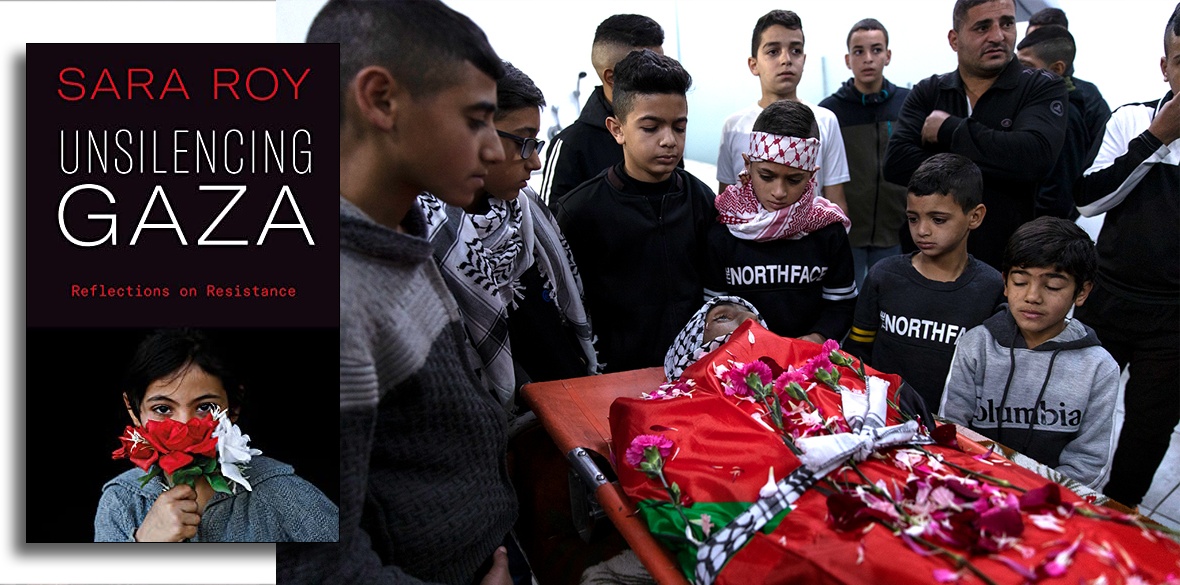This is the last article you can read this month
You can read more article this month
You can read more articles this month
Sorry your limit is up for this month
Reset on:
Please help support the Morning Star by subscribing here
Unsilencing Gaza – Reflections on Resistence
by Sara Roy
Pluto Press £19.99
SARA ROY’S stated aim in writing this book is to explain the significance of the occupation of Gaza, analysing its engineered and rapid decline under Israeli occupation, while showing how its people continue to resist in various ways.
As an academic she has undertaken over 30 years of research into the Israeli-Palestinian crisis and for this book has selected articles, letters and personal reminiscences which highlight the reasons for Israeli policy and describe the reality of living incarcerated in this blockaded enclave.
The facts and figures may be familiar, but they are stark and worth repeating.
Gaza measures 28 miles by five miles, around the square mileage of Sheffield and of its 2,000,000 inhabitants 65 per cent are refugees. The unemployment rate for 2020 was 49 per cent rising to 70 per cent for young people under 30. About 90 per cent of ground water is contaminated because the treatment of sewage is impossible.
Since the Hamas victory in the 2007 elections, Israel has besieged Gaza, creating an artificial situation in which Gaza’s economy has been all but destroyed, its social and cultural cohesion broken (evidenced by rising levels of prostitution, marital breakdown, suicide and destitution) and educational and medical facilities struggling to function.
Roy discusses Israel’s malign policies which have undermined all aspects of Gazan society, attempting to transform Palestinians from a people with political rights into a humanitarian problem; beggars whose physical needs are minimally addressed, but who have lost their political identity and therefore can make no political claims.
International aid, comprising mainly very basic foodstuffs is received by 80 per cent of the population and has maintained the appalling situation in Gaza rather than alleviating it: its purpose is to prop up the status quo and keep Gaza just above total disaster threshold.
Roy gives a clear explanation of the thinking behind Israel’s virtual disablement of Gaza as a functioning society, noting that keeping Gaza cut off from the West Bank and Jerusalem weakens the unity of the Palestinian cause and allows the expansion of Israeli settlements in the West Bank to continue unabated.
Roy’s main targets are of course Israel and its international allies, but she also berates the leadership of the Palestinian Authority for its silence, if not downright complicity with Israel when faced with the outrages in Gaza.
She also highlights accusations of corruption against Hamas and describes the disillusionment of those in Gaza who view Hamas no longer as a resistance organisation, but as a tool of Israeli oppression.
Inevitably, given the subject matter, there is a bleakness around some of the writing, but Roy has written poignantly of episodes of everyday life that she witnessed or was involved in, gaining insights into the lives and thoughts of ordinary people. These snapshots are often encouraging and uplifting.
The section on Roy’s Jewish ancestry and its effect upon her research and thinking, is a compelling one. In relating intimate details of her family’s life, she adopts a more direct, impassioned style and concludes that Jews must choose between Judaism and zionism.
She ends with the warning that if Israel continues to deny Palestinians human rights and the West continues to collude with that denial, there can be no peace. Meanwhile Gazans struggle to live a normal life with dignity and resilience in a most abnormal situation.
Yet she has hope for the future, saying Israel wields power but lacks strength, because its power instils fear and resistance in its victims. Therein lies its weakness and the seeds of its downfall.
Roy quotes the inspirational Palestinian rights activist Eyad el Sarraj, erstwhile director of Mental Health Services in Gaza, who believed that the most powerful form of resistance lies in maintaining one’s humanity in the face of tyranny, and in seeking that humanity in others, including one’s oppressors.











